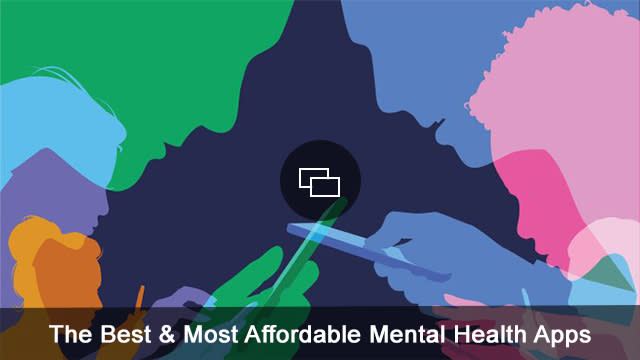Black Therapists Weigh In On How They’re Overcoming the Challenges of the Last Few Years & Recharging Their Mental Health

The realization that we are entering another year of pandemic living is a grounding thought that can put absolutely anyone on edge. As a country and a global family we’ve been coping for years. Any signs of relief have been quickly dashed by variants Delta and Omicron, or social, political, and racial unrest that makes any state of being outside of coping feel unsafe.
Therapists have been on the frontlines of helping people of all ages and backgrounds mine these feelings. In a nationwide survey of 1,320 therapists conducted by The New York Times in conjunction with Psychology Today respondents detailed that request for appointments have surged, wait times are longer, and the number of people in need of medication has also increased.
More from SheKnows
While the Times study notes that it did not specifically ask the therapists surveyed about their own mental health and feelings of exhaustion and burnout, “10 percent of respondents raised the issue on their own.”
While the respondents to the Times survey cut across various racial and socio-economic demographics, an understanding of intersectionality will tell you that BIPOC therapists shoulder a heavier burden. Race has revealed and magnified damning disparities throughout the pandemic, specifically regarding the number of COVID-19 patients who are hospitalized and ultimately die from the virus being disproportionately Black and Brown people. This fact coupled with the challenges of daily pandemic life such as working from home, having children enrolled in online school, never getting a break from one’s partner, as well as the added pressures of racial and social reckonings like the murder of George Floyd or the riot and insurrection at the Capitol on equally add increased stress on Black and Brown people seeking help, and Black and Brown practitioners trying to fill the gap.
Click here to read the full article.
SheKnows reached out to Black therapists to find out how they have not only cared for their patients during these stressful pandemic times, but also how they are caring for themselves and what they’re looking forward to — or managing better — in the new year.
Dr. Jessica M. Smedley, Licensed Clinical Psychologist, Washington, D.C.
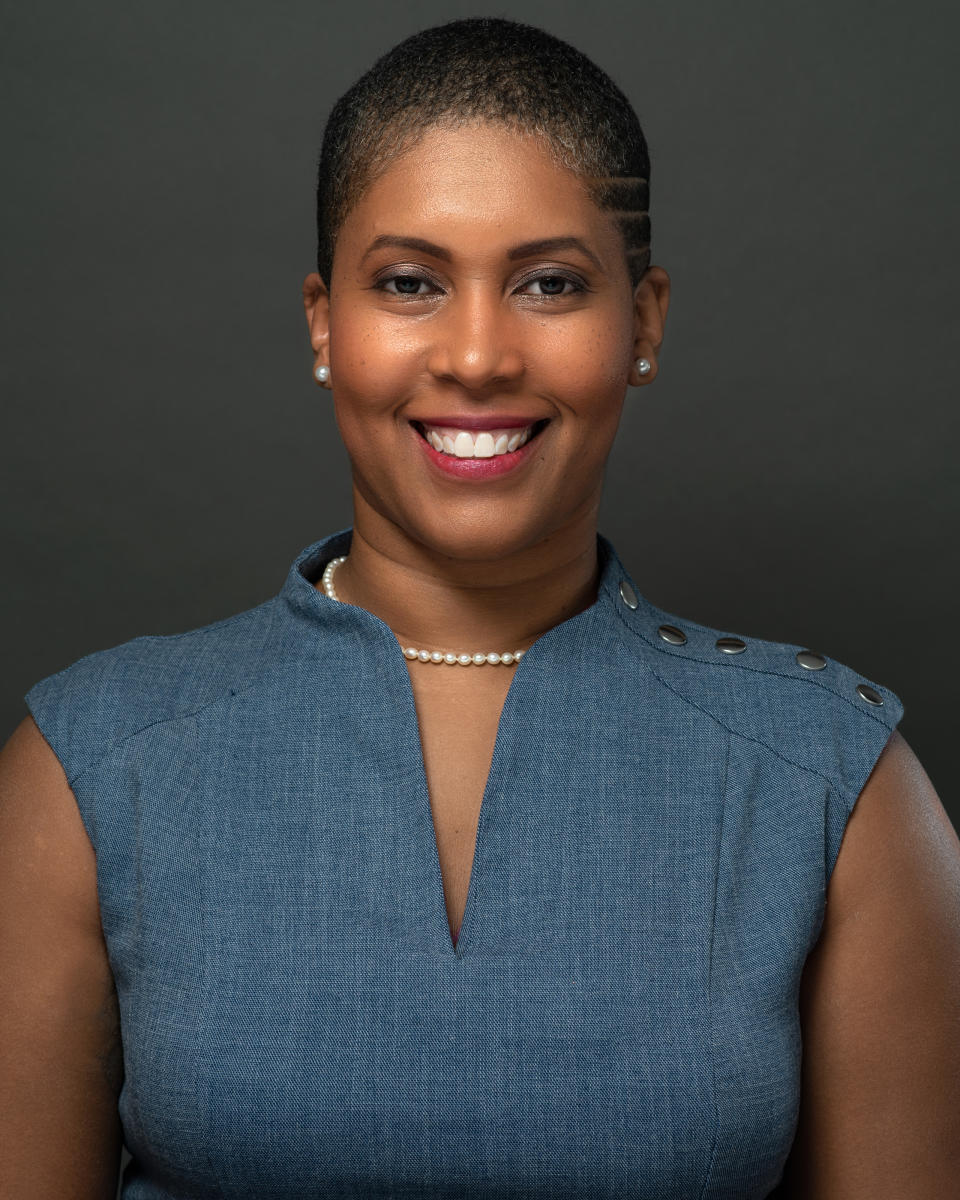
Cynthia Cephas
Twitter: @dr_smedley
Instagram: @dr.smedley
Dr. Jessica M. Smedley has been in practice for more than 15 years and is the proprietor of Smedley Psychological Services, LLC. She primarily works with women of color who are seeking healthy ways to manage their stress, anxiety, depression, and varying addictive behaviors. She holds on to the belief that she cannot ask and expect of her clients more than she is willing to do for herself when it comes to her own mental health. Dr. Smedley said, “One of the hardest things about being a mental health provider is when your own life is on fire. In a pandemic, all of our lives were on fire.” Dr. Smedley openly admits to struggling to cope and make space for herself because of the pressure of her responsibility to her clients and professional leadership roles. The pressure was compounded by the racial reckoning the country has experienced during the COVID-19 pandemic. “As therapists of color we can be triggered by clients who are not of the same race as us and who have different experiences or opinions of the violence occurring against Black bodies in the U.S,” Dr. Smedley said. “That makes it challenging to remain present as we are human first and our titles second.”
The toll of the pandemic and frequent racist violence left Dr. Smedley feeling distanced from herself. She is now trying to reintegrate by taking moments to pause, take a walk, as well as to monitor what she’s consuming from food to media. She said, “I try to challenge myself to think of what makes me feel the most empowered and to honor when I feel tired by actually resting or saying, ‘No’.”
In the New Year, Dr. Smedley said she plans to spend more time with loved ones, be present, and breast space for silence. She has a similar plan for her patients making sure they hold intentional conversations that set clear, specific goals of what their rest will look like. She said, “It is not helpful to be vague and just state “rest” or “set boundaries” because we don’t always have a clear vision of what that looks like.” Dr. Smedley will encourage her clients to take their intentionality a step further by setting a time limit like going to bed thirty to sixty minutes earlier.
In setting these goals to recharge and reconnect for herself and her clients Dr. Smedley is mindful that these are the essential steps for self- and community care. She said, “There is always a cost. You can’t be a great partner, parent, or professional if you are persistently tired, burnt out, irritable, and impatient.” Dr. Smedley urges people to be intentional, see one another, and not take for granted our collective resilience. She said, “It isn’t healthy to continue the generational notion of “pushing through.” [Instead we should] Focus on healing as an act of resistance to unhealthy society norms [and] give ourselves permission to advocate for ourselves.
Nya B, Licensed Mental Health Clinician & Nationally Board Certified Counselor, St. Louis, MO

Courtesy of Nya B
Twitter: @author_nya_b
Instagram: @author_nya_b
For 21 years, Nya B has worked as a mental health practitioner specializing in sexual abuse and trauma, couples, marriage, and family counseling, anger management and so much more. She believes that if you can run to the doctor with a cold then you can go to therapy when you’re stressed. Over the last two years she has managed the mental health of her patients while also managing her own which presented a major challenge. She shifted her exclusive in home practice to virtual, contracted COVID herself, took time off from her practice, and lost her mom all while trying to reassure others that they could survive any crisis as long as they were living. She said, “I knew that if I were to stop, I wouldn’t know what the other side of this looked like.” To keep going, Nya B researched and examined the tools she needed to build her new foundation including finding more time, more staff, resting more, or increasing the number of sessions she sat with her own therapist. “I am transparent about what I am feeling and what I need from my support system,” she said. “I make sure that I have a routine. I am intentional about doing the things I love [and] I also put a time limit on feeling negative emotions.”
In looking toward the new year, Nya B said she plans to be more intentional about taking care of herself so she can take care of others. “I teach this all the time that prioritizing oneself isn’t selfish, it is self-care,” Nya B said. “Now, I will say that I have to change my definitions of some things and learn that getting rest doesn’t mean that I am lazy.” In getting the rest that she needs Nya B is also rethinking how she maintains her practice by also getting the help that she needs. She said, “This may look like decreasing my pride about hiring help or decreasing my anxiety about trusting strangers to treat my practice the way I would.”
For the New Year Nya B said she wants to get up earlier and move slower so that she doesn’t feel rushed and drained. She’s also looking to expanding her services to care more for seniors. For her patients, Nya says her plan is to continue to emphasize her favorite word, boundaries. She urges her patients to leave the last two hours of the day or the first two hours of the day (or both) for themselves. In addition to these practices Nya B has three things she wants everyone—not just her patients—to remember.
Recognize that everyone is going through something, and no one’s problems are better or worse, they’re just different.
Let go of the idea of being “unbothered.” Everyone wants to behave like an unanswered call doesn’t bother them, or not being picked for a promotion isn’t a bother to them. Avoidance is a total slap in the face to the emotions that you were born to feel and it makes us more hypersensitive when we’re addressed with those challenges again.
Educate yourselves more on what goes on in your mind, body and spirit.
Amber Benziger, Therapist, Licensed Professional Counselor, New Jersey
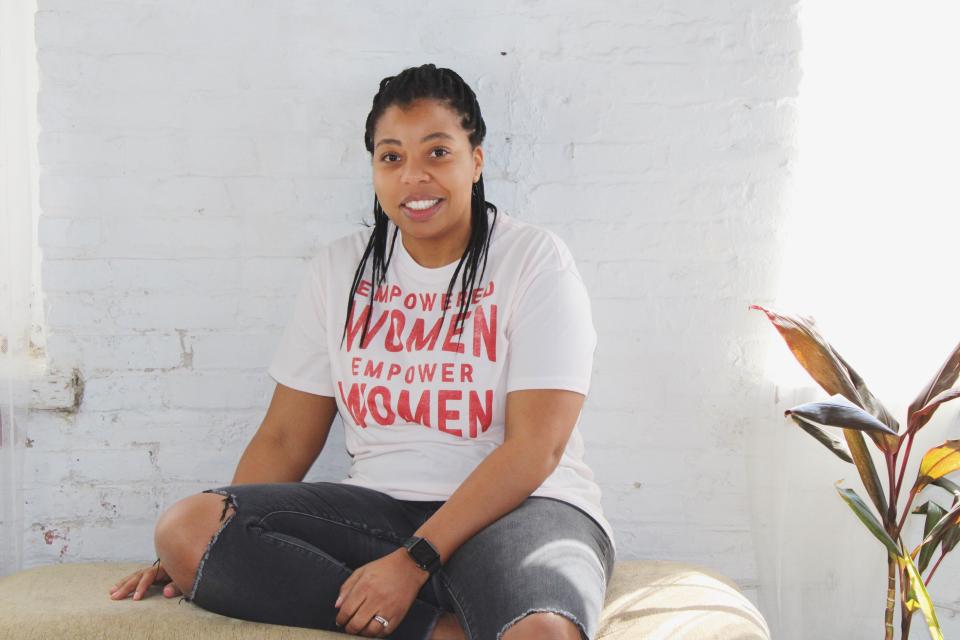
Courtesy of Amber Benzinger
Twitter: @amber_v_anxiety
Instagram: @amber_vs_anxiety
For the last 10 years, Amber Benziger has helped women experiencing anxiety disorders, burnout, and trauma through her Vitality Behavioral Health practice. She also launched The Anxiety Lab in 2020 a membership service that offers people enrolled monthly videos, workbooks, and other exclusive content to decrease anxiety while also offering the tools they need to cope. Benziger said one of the biggest challenges for her in 2020 and 2021 was trying to be fully present with her clients, family, and friends, while she was facing the exact same pressures that they were. “Everything felt heavy from all sides,” Benziger said.
To help herself cope, Benziger cut back the hours in her practice, returned to her own weekly therapy sessions, and found new outlets for self care. She said, “I have increased my journaling practice. I give myself time every night to brain dump all that’s weighing on me.” Additionally Benziger’s been focused on taking planned time off on a regular basis and setting clear boundaries in her practice with her clients. She said, “I want to advocate for rest being a priority and [help] them to shift their priority list to include themselves.”
In advocating for rest and prioritizing oneself, Benziger said “hustle culture has to go.” She believes the “Rise & Grind” memes we share and sometimes aspire to within the social media ecosystem is not only unrealistic but detrimental to our mental health.
As she prepares for another year, Benziger has set a goal to be kind to herself and to practice compassion and self-acceptance. She says by prioritizing her mental health needs in this way her body won’t be forced to do it for her. “Headaches, panic attacks, anxiety will start to increase. You won’t be able to continue to function the way you want to if you don’t make your mental health a priority as mental health is health.”
Dr. Je Ajayi, Board Certified Psychiatrist, Atlanta
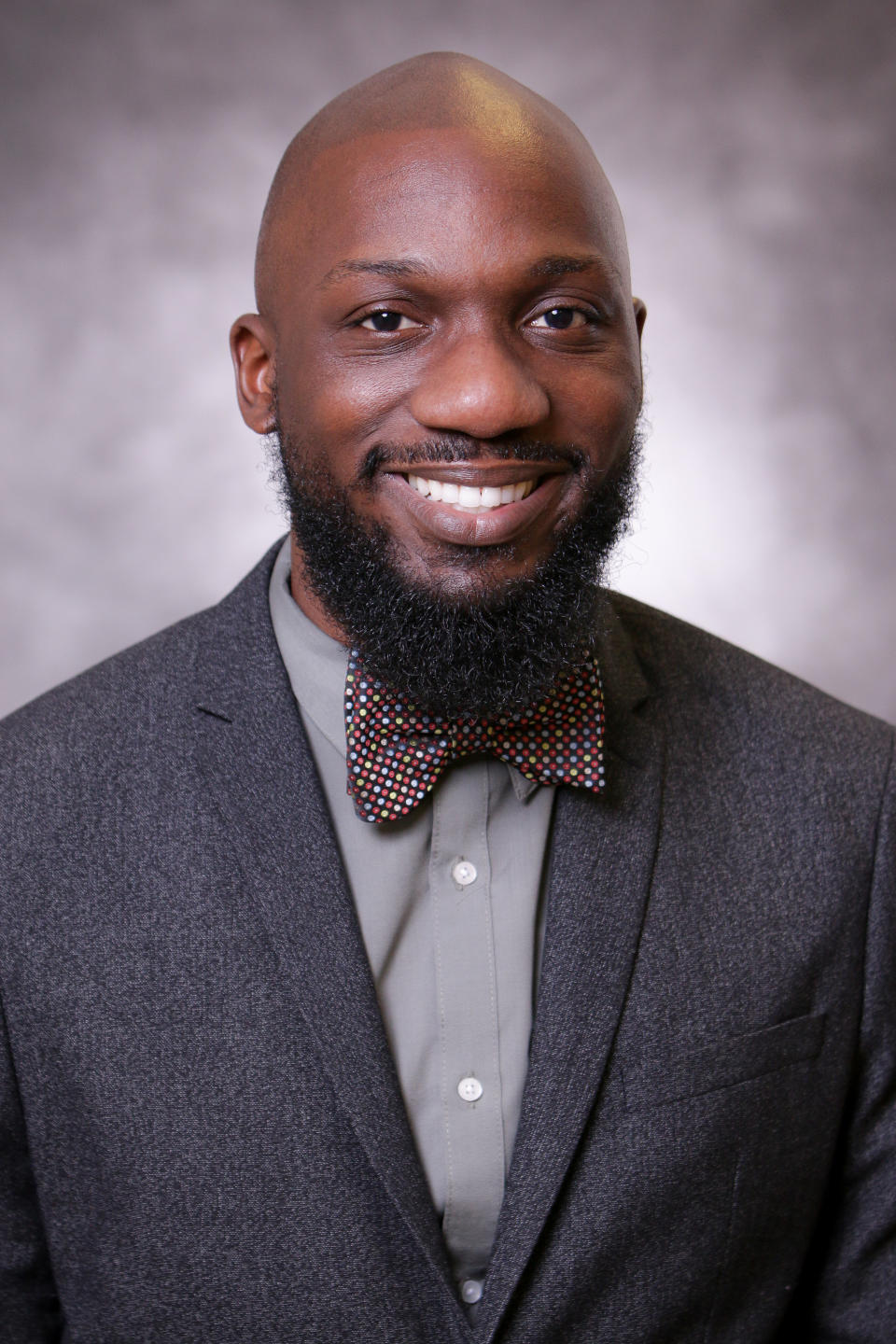
KreativTouch Photography
Facebook: @jeajayi
Dr. Je Ajayi has been a practicing psychiatrist for the last five years. He is currently on staff with Connected Minds in metro Atlanta where the group practice specializes in everything from anxiety and depression, bipolar disorder and schizophrenia, PTSD and ADHD, and more. Being a prescribing mental health physician who is also a full-time emergency room psychiatrist Dr. Ajayi has seen the worst of the COVID-19 pandemic. “Everyone was knocked clean off their feet, including those of us who provide mental health care,” he said. “I saw ER rooms at 200% capacity, hospital staffing stretched to its thinnest, and the death rate spiraling out of control.” These conditions led to many of Dr. Ajayi’s patients with preexisting conditions to do a mental spiral. One he was not always able to immediately talk them through. He said, “Truthfully, there have been moments where I have had challenges finding the right words to say to clients who voice feeling helpless, anxious, or even hopeless about the future.”
In shouldering the mental burdens of his patients, Dr. Ajayi found his own mental state in decline. He said he was irritable at work, making careless mistakes, and not enjoying his professional or personal life. To correct he began seeing a therapist. “It turned out to be the best decision I ever made,” he said. Dr. Ajayi is also practicing holistic lifestyle modifications to reduce stress including meditation and practicing yoga. Dr. Ajayi said, “Yoga is my favorite activity to relieve stress and I practice it daily before my gym routines. I find that meditation and yoga force the body and mind to be still.”
Continually finding this stillness is a goal for Dr. Ajayi in the New Year. While he said he’s not one for New Year’s resolutions, he’s breaking his own tradition and prioritizing taking much needed breaks from work to recharge. He said, “I hope to transform the guilt I sometimes feel for taking time-off into acceptance that without taking time for myself, I cannot do my job effectively or give my clients what they deserve.”
As for his patients, Dr. Ajayi said he will encourage them to take care of their physical health as well as their mental health. “Evidence shows that better physical health improves mental health and can decrease depression, anxiety, burnout, and a variety of other psychiatric disorders,” Dr. Ajayi said. He believes people across the country should pay more attention to their physical health to improve their self-care. In addition to the physical aspects of self-care Dr. Ajayi wants people to remember to do something you love each day that makes you smile and not worry or stress. “A little selfishness goes a long way.”
Myisha Jackson, Licensed Professional Counselor, Monroe, LA

Crowned Photography
Twitter: @myishamjackson
Instagram: @myishajacksonlpc
Myisha Jackson has worked in the mental health field for more than five years. She opened her own practice, Healing Journey Counseling Center, in July of 2019 where she works primarily with Black millennial women and teen girls who are struggling with anxiety, depression, and relationship issues. Months after opening the COVID-19 pandemic swept the world and Jackson found that the need for her services in her area were great than what she could singularly fulfill. “My phone was ringing non stop as well as voicemail and emails were filled with people reaching out for services,” Jackson said. She said she had to refer out a lot of potential clients and patients because she knew how many people she could realistically see in a day and in a week. “It hurt to turn people away,” Jackson said, “but I had to make sure I was in good health for my current clients, my family, and of course myself.”
In order to overcome being burnt out herself, Jackson added a second clinician to her practice. She said she’s not taking on any new patients in the first quarter of the year so she can take time to focus on helping the new therapist increase their case load. Additionally, Jackson does not work on Friday. She reserves that day for self-care to get her hair and nails done. “I keep myself up,” Jackson said. “It makes me feel good on the outside and inside. I try to keep my cup overflowing so I do a lot of things that I love.”
In prioritizing her own self-care, as well as taking vacations in the New Year, she said she wants to help clients create boundaries in their life. She said, “I work primarily with women who struggle with putting themselves first. They struggle with putting balance between work, school, motherhood, [and/]or relationships. I want to make sure I create more content and resources for women [who] are struggling in that area. I want to teach them that it is okay to put yourself first and [it] does not mean that you are selfish.”
Jackson said it is essential for women to take care of themselves first; to prioritize themselves first so that they know what their own needs are and not only the needs of their partner or child(ren).
Bianca Hughes, Licensed Professional Counselor, Atlanta

Instagram: @authenticallybeyou
Facebook: @authenticallybu
Bianca Hughes has worked as a licensed professional counselor for six years and is the proprietor of Authentically Be You Counseling and Wellness in Atlanta. In her practice, Bianca works with women struggling with perfectionism to help them embrace their imperfections and authentically be themselves. When the pandemic hit, Bianca admits she did not cope well. She said, “There was a time where I would come home and cry every day for a week or two due to the emotional toll.” This emotional toll manifested itself for Bianca by forcing her to move her in-person practice online, a transition she found difficult because of her preference for face-to-face sessions. She also felt helpless trying to help clients because she was never trained for a pandemic. That helplessness coupled with the racial violence overwhelmed Bianca personally and professionally.
To cope, Bianca grounded herself in her faith. She said, “Staying connected in my relationship with God is my foundation, this can be in prayer, worship, reading the Bible, being in nature or talking with friends.I have been taught I am my tool and so I have to make sure I am taking care of me.” In taking care of herself Bianca discovered new hobbies and also rested a lot. In her practice she set a boundary of only seeing clients three days a week for a max of six clients a day. If she exceeds this number Bianca said she tries to be gentle with herself and take even more time to rest. And by rest she doesn’t mean sleeping. Her rest and restorative practices include doing a jigsaw puzzle or taking a walk by the river in her area.
As she moves into the New Year Bianca said she plans to prioritize more time to travel, stay connected with family and friends, and laugh. She prescribes laughter for her clients as well. She wants to make sure they’re focused on their self-care and are checking in with themselves so that they’re working smarter and taking time off.
One goal, Bianca has is to decolonize her practice by looking at ways that she currently provides care that may be unhelpful and then offering a different modality of care. This same type of specific intentionality is what Bianca preaches to her own clients. She said she wants people to become intentional about becoming their own best friend. “This looks like taking the time to say kind words to yourself and treat yourself kindly. When you practice being kind to yourself more often it then flows out into community care.”
Angela Thompson, Licensed Independent Clinical Social Worker & Substance Abuse Professional

Instagram: @travelsocialworkcoach
Angela Thompson is a travel social worker. For more than seven years she has worked across the country helping her clients who are experiencing depression and anxiety and treating them through cognitive behavioral therapy. When the pandemic hit, Thompson admits to feeing emotionally drained and helpless. However, she said teletherapy provided a different level of intimacy with her clients. She also was able to overcome the feelings of being drained and helpless by acknowledging her own feelings and understanding why she was experiencing those emotions. She said, “I guarded my heart by filtering what I allowed myself to watch, listen, and partake in.”
During this time, Thompson made sure to prioritize her mental health by employing what she emphasizes to clients; self-care. “I am intentional about creating healthy boundaries and sticking with those boundaries even if it feels uncomfortable,” Thompson said. “I am more aware of the importance of my time; I often tell myself that my downtime is not an invitation to add more tasks to my to-do list. I deserve to rest!” As she prepares for the New Year, Thompson has a six step plan she will follow that she considers the essential steps for self care:
Practicing gratitude.
Being present in the moment. This is an area that I need to improve upon. I plan to do this by putting my phone away when I have company
Taking a break!
Listening to my body!
Therapy
Taking care of your physical health
Angela wants her clients to follow these same six steps as well. In addition to these steps she said she will help them recharge by creating boundaries for themselves so that they make themselves a priority. “My goal is to help clients recognize what feels like self-love and allow those things to recharge them. I use specific exercises to recognize when they are becoming depleted therefore they will know what to do to recharge.” Angela believes that if people voluntarily make their mental health a priority it won’t involuntarily disrupt your overall well-being.
Doctor Candace Southall, Ph.D., Licensed Professional Counselor, Baytown, TX
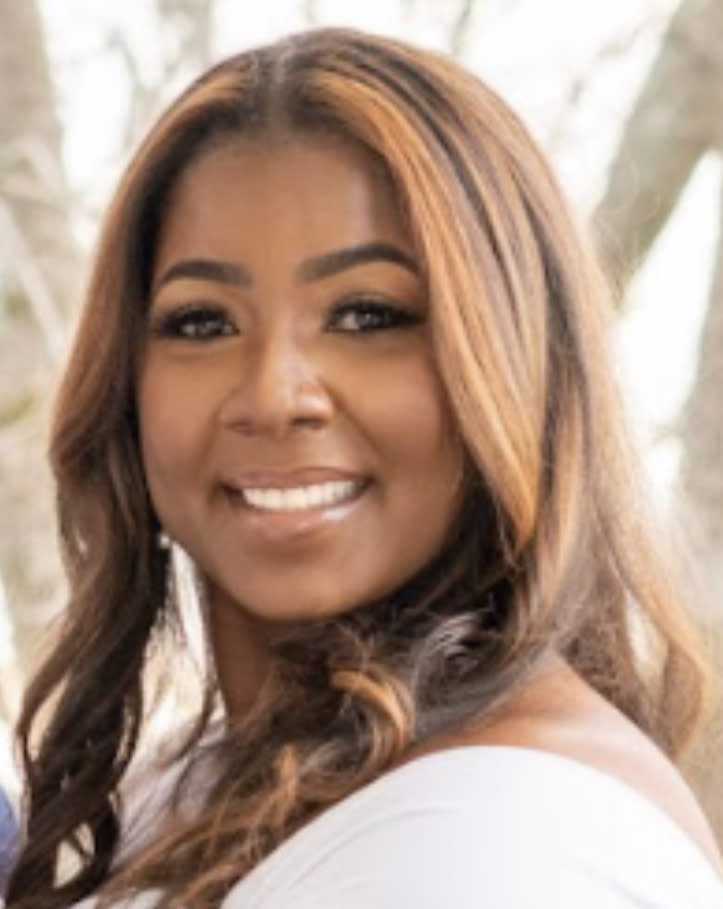
Instagram: @Shalomcounseling_cs
Doctor Candace Southall has practiced as a licensed professional counselor for the last six years. She is on staff with CRM Counseling and Wellness which is contracted from Shalom Counseling and Consultation in Baytown, TX. Doctor Southall specializes in anxiety, depression, grief, and relationships and is looking forward to expanding her work into sports psychology, working mental health into corporate America by contracting with different agencies, as well as helping military personnel assimilate back into civilization. However, before she could set off on conquering these new goals she had to first overcome the challenges of the past two years. Because of the scourge of COVID-19 Doctor Southall have to conduct her own mental health checkin. She said, “I found myself on autopilot trying to help others.” To get out of autopilot and back in drive Doctor Southall added alone time in the morning to discover how she was feeling, scanning her body to determine how it was feeling, and writing in a gratitude journal. Of incorporating these mindfulness practices Doctor Southall said, “I realized that carving out time for myself to checkin with how I am feeling was just as important as putting on a seatbelt. It wasn’t an option. It was necessary for my sanity.”
By incorporating these mindfulness practices into her daily and nightly routine and seeing the benefits thereof, Doctor Southall said she will now encourage her clients to practice the same. These practices include checking in with self, finding alone time and things you enjoy, deep breathing exercises, and having a gratitude jar or writing in a gratitude journal. Doctor Southall also recommends a grounding technique that requires the identification of the following:
5 things you can see
4 things you can physically feel
3 things you can hear
2 things you can smell
1 thing you can taste
“It’s so easy to get caught up in the monotony of life,” Doctor Southall said. “These practices will help you slow down, get in tune with yourself and become intentional about things you appreciate which may have a positive impact on your perspective towards life.”
Doctor Southall is also looking forward to taking days off and not doing anything that’s a task in the New Year. For her clients she urges them to not wait for others to ask them how they feel, but to keep the checkins—with self or a therapist—consistent so a negative connotation is not attached to seeking mental health help. Doctor Southall also recommends setting goals; mental health goals especially. She said, “These could include responding in a more appropriate way when triggered or unpacking past trauma. I also feel it’s imperative to include a plan to get back on track with your goals if things don’t go as planned. Win the hour and start over whenever deemed necessary. Rid yourself of the unnecessary pressures of life and live!”
Natasha Ellis, Mental Health & Addiction Specialist, Los Angeles, CA
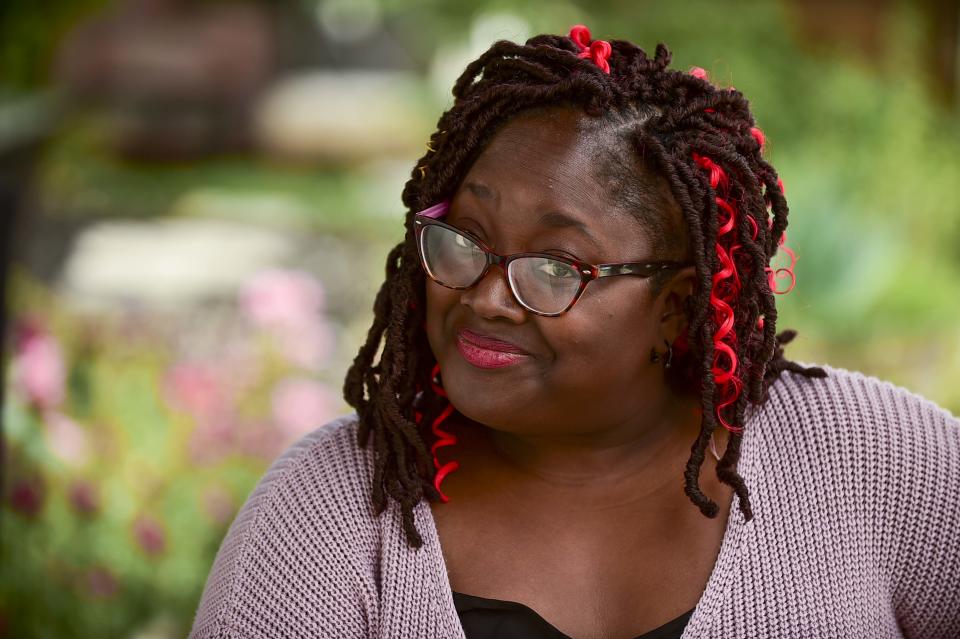
MICHAEL BEZJIAN
For 16 years, Natasha Ellis has worked as a mental health and addiction specialist. The proprietor of Striving for Serenity, Ellis is a certified laughter yoga practitioner in addition to helping clients navigate mental health and addiction recovery.
In the earliest days of the COVID-19 pandemic, Ellis lost her father to the virus. She had to say her last words to him over the phone due to the lockdown. “It was almost too much to bear,” Ellis said. In addition to the profound personal loss, Ellis also faced a reduction in income. While providing mental health services to teens on a crisis suicide line and senior citizens—of which there was an uptick in need for both of these populations—the agency she was working for severely reduced and in some instances ceased operations. These challenges forced Ellis to find new and inventive ways to help her clients cope and manage their symptoms. She said, “My role as a mental health and addiction specialist is someone who lives with a diagnosis and has entered recovery and is maintaining recovery.” Ellis has been trained and educated to provide support to people who are going through mental health or addiction challenges and help guide them along their path to wellness.
To keep on top of her own wellness journey, Ellis continued working with her own therapist, attending support meetings, taking her medication, and allowing herself the fullness of feeling all of her feelings. She also plugged in with loved ones and was sure to exercise and engage in faith and spiritual practices. Ellis said, “My work is a big piece of what keeps me in the process of healing and recovery other than my inner resolve because I know that I am a living example modeling recovery, hope, and healing.” In modeling these attributes for others still struggling, Ellis said she strives to make her mental health a priority because she knows what a detriment to her life it will be by not prioritizing.
In this way, she supports her clients by asking them to challenge themselves in ways they’ve struggled to. She said, “I want to impart the wisdom I’ve learned between the difference between rest and restoration because it’s an important difference.” Ellis also wants to help people who struggle with cultivating joy and resilience. She encourages them to check in regularly with family and loved ones, have empathy, socialize (even if it’s virtual) and to prioritize rest and restoration. “Rest regenerates our physical body and restoration [is participating in] activities that leave you mentally and emotionally repaired and energized.”
Ellis said she is working on doing things she rarely does for self-care like taking a vacation and reevaluating her endeavors to make sure she is in alignment and purpose.
Themes of rest, self-care, and setting boundaries echo throughout each story of these therapists. They all agree that in a new year mental health should be a priority for everyone and the connection between mind body and spirt. Natasha Ellis put it simply using this quote, “Make time for you wellness or you will be forced to make time for your illness.”
Before you go, check out the best mental health apps for giving your brain some extra TLC:
Best of SheKnows
Sign up for SheKnows' Newsletter.
For the latest news, follow us on Facebook, Twitter, and Instagram.
